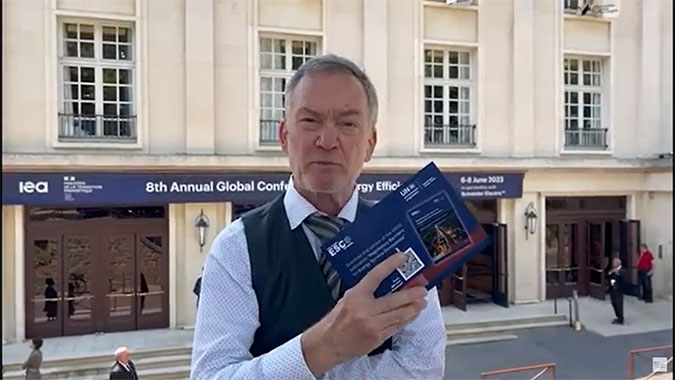Dr. Søren Lutken, Chairman of the Global ESCO Network, announces the launch of the 2nd edition of the publication Regulatory Barriers for Energy Service Companies 2023 during the 8th Annual Global Conference on Energy Efficiency in Paris, France in June 2023. (Video Grab: Global ESCO Network)
PARIS, FRANCE, June 6, 2023 – Climargy’s “unique and pioneering” portfolio aggregation model for energy service company (ESCO) projects in the Philippines was featured in a global publication of the Global ESCO Network and the UNEP Copenhagen Climate Centre entitled Regulatory Barriers for Energy Service Companies 2nd Edition. The publication was launched today during the International Energy Agency’s 8th Annual Global Conference on Energy Efficiency in this city.
The Global ESCO Network said in pages 30-31 of the report that Climargy, as a pioneer private super-ESCO aggregator of ESCO project assets, was established to address the market gap in energy efficiency project aggregators and fund-like or super-ESCO equity providers of project capital. Its aggregation model was designed to address the gross market failure to scale-up energy efficiency portfolio finance, caused by the common financial barrier for ESCOs in most Asian markets accessing suitable bank lending or debt finance to pursue their long-term pipeline of ESCO-financed performance contracts. Portfolio aggregation allows Climargy to pool several small (less than USD 5 million) ESCO projects to attract corporate equity from major energy developers, now recognizing energy efficiency as a distinct investment asset class for the first time.
The report also featured Climargy’s joint development partnership with Pi Energy of the Lopez Group’s First Philippine Holdings Corporation to combine their knowledge and capital resources to pursue a robust investment portfolio of energy efficiency projects in the Philippines, targeting no less than 1 terawatt-hours of energy savings in the commercial and industrial sector. The publication also reports on Climargy’s partnership with the UNOPS Southeast Asia Energy Transition Partnership to mobilize grant funding to subsidize and de-risk otherwise expensive upfront (Level III) investment-grade energy audits of target host commercial and industrial sector entities in its investment pipeline.
Supported by the UNEP Copenhagen Climate Centre through the Copenhagen Centre on Energy Efficiency, the Global ESCO Network was established to be the global driver and inspire government actions for scaling up the contribution of ESCOs to the global response for mitigating the threat of climate change and the goals set out by the Paris Agreement. To realize this, the Global ESCO Network reinforces existing efforts of national and regional ESCO Associations to promote increased activities by the ESCO sector at a global scale.
In the second edition of its publication Regulatory Barriers for ESCOs, 19 ESCO associations have provided comprehensive answers to 15 questions that illuminate different aspects of regulatory barriers for ESCOs. The formulation of the questions was informed and inspired by interviews that were conducted in 2021 for the first edition of this publication, where focused interviews with 10 ESCO associations served as the basis for the analysis. The renewed analysis has been performed from March to May 2023, following through on the ambition to expand the analysis to other countries based on the typology that was established in the first edition.
The focus here is on regulatory barriers, because these policy makers can help address and alleviate. Regulation can even be used actively as instruments in pursuit of emissions reduction objectives through the reduced use of energy. As such, this publication similarly presents itself as a simple guidebook for policymakers regarding which interventions they could easily turn to in order to activate the ESCOs in support of energy efficiency strategies and policies.
The growing urgency of decisive responses to a rapidly changing climate, and the inherent ESCO promise of delivering profitable investments to the same effect, mandate a prominent role for the ESCO community in the global climate-change agenda.
Visit Global ESCO Network publication webpage and download full report


